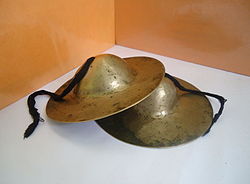
Back তাল (বাদ্যযন্ত্ৰ) Assamese झ्याम्टा Nepali Madjira Dutch ଗିନି (ବାଦ୍ୟଯନ୍ତ୍ର) OR ਤਾਲ (ਸਾਜ਼) Punjabi தாளம் (இசைக்கருவி) Tamil తాళాలు Tegulu
This article needs additional citations for verification. (April 2021) |
 |
The taal or manjira (also spelled manjīrā or manjeera), jalra, karatala, kartal or gini is a pair of clash cymbals,[1] originating in the Indian subcontinent, which make high-pitched percussion sounds. In its simplest form, it consists of a pair of small hand cymbals.[2] The word taal comes from the Sanskrit word Tālà, which literally means a clap. It is a part of Indian music and culture, used in various traditional customs e.g. Bihu music, Harinaam etc. It is a type of Ghana vadya.
In Hindu religious contexts it is known as karatala (karatāla; kara "hand", "arm" and tāla "rhythm", "beat"), typically used to accompany devotional music such as bhajan and kirtan. They are commonly used by Hare Krishna devotees when performing harinam, but are ubiquitous to all Hindu devotional music. It is also called karatala or kartal (pronounced as “kartel”) in some contexts.
- ^ "Solid Instrument Article, Musical Instruments: Solids, Solid Instrument From New Delhi, Solid Instrument Musical Instrument, Popular Solid Instrument, New Delhi Based Solid Instrument". 4to40.com. 14 March 2007. Retrieved 28 February 2013.
- ^ Caudhurī, Vimalakānta Rôya (2007). The Dictionary Of Hindustani Classical Music. Delhi, India: Motilal Banarsidass. p. 173. ISBN 978-81-208-1708-1., originally published in 2000
© MMXXIII Rich X Search. We shall prevail. All rights reserved. Rich X Search